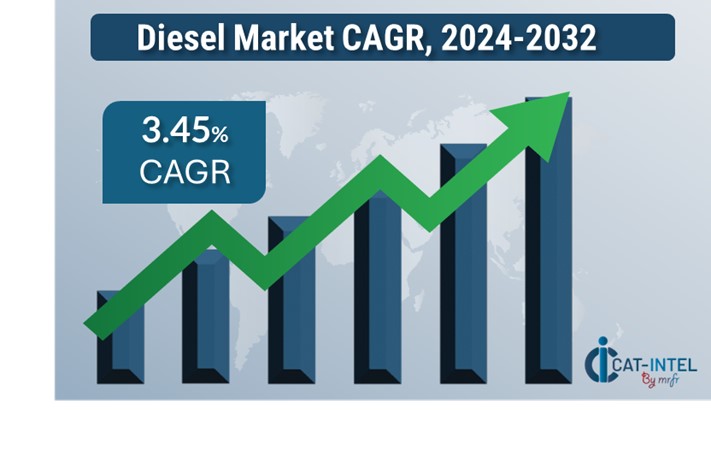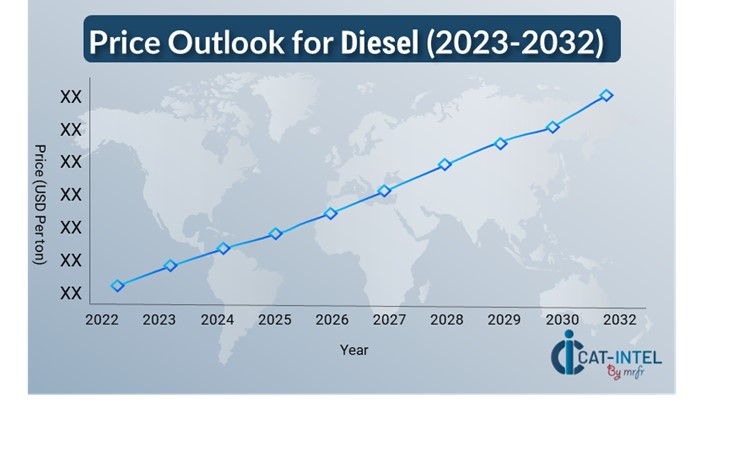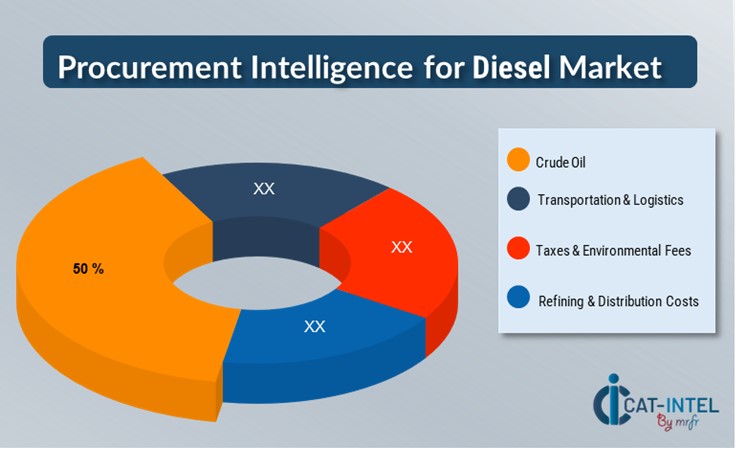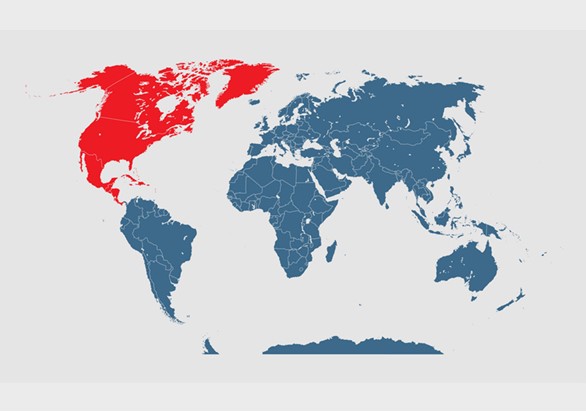Summary Overview
Diesel Market Overview:
The global diesel market is witnessing steady growth, driven by demand across industries such as transportation, power generation, agriculture, and manufacturing. This market encompasses various types of diesel fuels, including automotive diesel, industrial diesel, and marine diesel. Our report provides a detailed analysis of procurement trends, emphasizing cost optimization strategies and the adoption of digital tools to enhance procurement and supply chain processes.
Key future challenges in procurement include managing fluctuating crude oil prices, ensuring supply chain stability, and meeting growing demands for cleaner fuel alternatives. Digital procurement tools and strategic sourcing are essential for optimizing the diesel supply chain and ensuring long-term competitiveness. As global demand continues to rise, companies are leveraging market intelligence to enhance operational efficiency and mitigate risks.
The diesel market is expected to maintain steady growth through 2032, with key highlights including:
-
Market Size: The global diesel market is projected to reach USD 1336.87 Billion by 2032, growing at a CAGR of approximately 3.45% from 2024 to 2032.
Growth Rate: 3.45% 
-
Sector Contributions: Growth in the market is driven by: -
Transportation Sector Demand: Rising need for diesel as a primary fuel for commercial vehicles and freight transport. -
Industrial Applications: Increased reliance on diesel for power generation and heavy machinery in construction and mining sectors. -
Technological Transformation: Advancements in fuel technology, such as ultra-low sulfur diesel (ULSD), are enhancing performance while reducing environmental impact. -
Innovations: Innovations in diesel engine designs and fuel additives are improving efficiency, reducing emissions, and extending engine lifespans. -
Investment Initiatives: Companies are investing in infrastructure for cleaner diesel production, including advanced refining techniques and alternative fuel research. -
Regional Insights: Regions such as North America remain significant contributors due to robust industrial activities and expanding transportation networks.
Key Trends and Sustainability Outlook:
-
Digital Integration: Automation in diesel procurement and inventory management is improving efficiency and reducing operational errors. -
Advanced Refining Processes: Enhanced refining technologies are producing cleaner and more efficient diesel fuels. -
Focus on Sustainability: Increasing emphasis on reducing emissions and transitioning to bio-diesel blends to meet environmental standards. -
Customization Trends: Rising demand for diesel tailored to specific applications, such as high-performance fuels for industrial machinery. -
Data-Driven Operations: Utilizing analytics to forecast demand, optimize fuel procurement, and ensure compliance with quality standards.
Growth Drivers:
-
Transportation Sector Growth: Expanding logistics and e-commerce driving demand for diesel-powered fleets. -
Industrial Needs: Growing reliance on diesel for uninterrupted power supply in remote and urban areas. -
Agricultural Requirements: Demand for diesel in farming equipment and irrigation systems to enhance productivity. -
Sustainability Goals: Adoption of cleaner diesel alternatives to meet regulatory and environmental standards. -
Regulatory Compliance: Adherence to stringent fuel quality and emissions regulations in transportation and industrial sectors.
Overview of Market Intelligence Services for the Diesel Market:
Recent analyses have highlighted key challenges such as fluctuating crude oil prices and the need for cleaner diesel solutions. Market intelligence reports offer actionable insights into procurement opportunities, helping companies identify cost-saving measures, optimize supplier management, and enhance supply chain resilience. These insights also support compliance with industry regulations and uphold high standards of quality while effectively managing costs.
Procurement Intelligence for Diesel: Category Management and Strategic Sourcing:
To stay competitive in the diesel market, companies are streamlining procurement processes through spend analysis and supplier performance tracking. Effective category management and strategic sourcing are critical to reducing procurement costs and ensuring a consistent supply of high-quality diesel. By leveraging actionable market intelligence, businesses can refine their procurement strategies and negotiate favourable terms for their diesel requirements.
Pricing Outlook for Diesel: Spend Analysis
The pricing outlook for diesel is expected to remain moderately volatile, with fluctuations primarily driven by global oil prices, geopolitical events, refinery capacities, and environmental regulations. Changes in crude oil prices, which significantly affect diesel production costs, along with transportation expenses, will continue to play a crucial role in shaping price trends. Additionally, the increasing global focus on carbon emissions and stricter emission standards may influence diesel pricing, particularly with the transition to cleaner energy sources and alternative fuels. Graph shows general upward trend pricing for Diesel and growing demand. However, there may be fluctuations influenced by economic conditions, technological advancements, and competitive dynamic.
Graph shows general upward trend pricing for Diesel and growing demand. However, there may be fluctuations influenced by economic conditions, technological advancements, and competitive dynamic.
Efforts to optimize procurement strategies, leverage hedging techniques for fuel price stability, and adopt more efficient technologies are critical in managing diesel pricing. Using digital tools for price forecasting, enhancing fuel inventory management, and negotiating favourable long-term contracts with suppliers will be essential for minimizing cost impacts.
Partnering with reliable fuel suppliers, exploring alternative energy sources, and adopting fuel-efficient technologies can help companies effectively manage diesel pricing while addressing environmental goals.
Cost Breakdown for Diesel: Total Cost of Ownership (TCO) and Cost-Saving Opportunities
- Crude Oil (50%)
- Description: The largest component of diesel pricing, crude oil costs, directly impact diesel production prices. Fluctuations in global oil prices, due to geopolitical factors, OPEC decisions, and changes in global supply and demand, are key drivers.
- Trends: Companies are looking to mitigate price volatility by securing long-term contracts with crude suppliers, investing in strategic oil reserves, and monitoring market conditions to make informed purchasing decisions.
- Transportation & Logistics (XX%)
- Taxes & Environmental Fees (XX%)
- Refining & Distribution Costs (XX%)
Cost-Saving Opportunities: Negotiation Levers and Purchasing Negotiation Strategies
In the diesel industry, optimizing procurement processes through strategic negotiation tactics can result in substantial cost savings and improved operational efficiency. Establishing long-term agreements with fuel suppliers, particularly in key regions, can provide better pricing and more favorable terms such as volume discounts and lower transportation costs. Bulk fuel purchasing and forward contracts offer the opportunity to lock in prices, reducing exposure to price volatility.
Partnering with suppliers who focus on sustainability and innovation can also bring cost savings, such as access to cleaner fuel alternatives and more efficient fuel sourcing methods. Leveraging digital tools for fuel procurement and supply chain management, including real-time tracking, consumption analysis, and fuel price forecasting systems, helps improve efficiency, minimize stockouts, and reduce overall procurement costs. By diversifying supplier networks and adopting multi-supplier strategies, companies can better manage risks related to fuel shortages or disruptions, while also gaining greater leverage in negotiations.
Supply and Demand Overview for Diesel: Demand-Supply Dynamics and Buyer Intelligence for Effective Supplier Relationship Management (SRM)
The diesel market faces a dynamic balance between supply and demand, influenced by a variety of factors such as crude oil availability, geopolitical events, environmental regulations, and technological advancements in energy production. As global demand for energy continues to rise, the demand for diesel remains robust, particularly in sectors like transportation, agriculture, and industrial applications.
Demand Factors:
-
Transportation and Logistics: The global demand for diesel is driven by its widespread use in transportation and logistics. Heavy-duty trucks, buses, and industrial machinery are all major consumers of diesel fuel, pushing demand. -
Energy Production: Diesel continues to play a role in power generation, particularly in regions with unreliable grid systems or in backup power systems. -
Sustainability and Regulations: Increasing environmental regulations around fuel emissions and a shift toward cleaner energy sources are influencing diesel demand. However, demand is expected to remain stable in sectors where alternatives are not yet viable. -
Global Economic Growth: Economic expansion in emerging markets, particularly in Asia Pacific and Africa, is contributing to higher diesel consumption as industries and transportation networks grow.
Supply Factors:
-
Crude Oil Availability and Prices: Diesel supply is closely tied to the global availability and pricing of crude oil. Fluctuations in crude oil prices, driven by geopolitical tensions, production quotas, and OPEC decisions, directly affect diesel supply and costs. -
Refining Capacity: The ability to process crude oil into diesel is influenced by the refining capacity in different regions. Shortages in refining capacity, or inefficiencies in refining processes, can lead to supply disruptions. -
Environmental Regulations: Stricter emission standards and regulatory requirements in various regions may impact the supply of diesel, particularly as refineries adjust to produce cleaner diesel alternatives or face increased compliance costs. -
Alternative Energy Sources: The growing availability and development of alternative energy sources, including biofuels and electric vehicles, could impact the demand for diesel, especially in transportation.
Regional Demand-Supply Outlook: Diesel The Image shows growing demand for Diesel in both North America and Asia Pacific, with potential price increases and increased Competition.
The Image shows growing demand for Diesel in both North America and Asia Pacific, with potential price increases and increased Competition.
North America: Dominance in Diesel
North America, particularly the U.S., remains one of the largest consumers of diesel fuel, primarily due to its reliance on diesel-powered vehicles in the transportation and logistics sectors.
-
Regulatory Impact: Stricter emission standards are pushing refineries to adopt cleaner fuel production technologies, which may affect diesel pricing and availability. -
Logistics and Transportation: The booming e-commerce and freight sectors are driving consistent demand for diesel, ensuring a steady market for diesel suppliers. -
Energy Alternatives: The ongoing shift toward renewable energy and electric vehicles in North America may temper future diesel demand, but for the foreseeable future, the market remains robust. -
Regulatory Changes: In response to increasing environmental concerns, the region is focusing on improving fuel quality, reducing emissions, and integrating cleaner energy solutions into its diesel supply chains.
North America Remains a key hub Diesel price drivers Innovation and Growth. 
Supplier Landscape: Supplier Negotiations and Strategies
The supplier landscape in the diesel industry is characterized by a mix of global oil producers, regional refineries, and alternative energy providers, all competing to meet the growing demand for fuel. These suppliers significantly influence key factors such as pricing, fuel quality, and distribution capabilities. The market is dominated by large, established oil companies and refineries that control most of the supply, while smaller, regional suppliers and alternative fuel providers cater to niche segments and emerging demand for cleaner energy sources.
In major refining and production regions, a combination of leading global players and regional providers shape the diesel supply landscape. As diesel demand remains robust across industries like transportation, agriculture, and energy, suppliers are focusing on enhancing refining capabilities, investing in cleaner fuel technologies, and improving distribution networks to meet the evolving needs of the market.
Key Suppliers in the Diesel Market Include:
- ExxonMobil
- Shell
- Chevron
- BP (British Petroleum)
- TotalEnergies
- Phillips 66
- Reliance Industries
- PetroChina
- Indian Oil Corporation (IOC)
- Valero Energy

Key Developments Procurement Category Significant Development:
Significant Development |
Description |
Market Growth |
The diesel market continues to experience steady growth, driven by demand in sectors such as transportation, logistics, and energy production, especially in emerging economies. |
Sustainability Focus |
There is an increasing emphasis on cleaner diesel alternatives, such as biodiesel and synthetic diesel, as well as efforts to reduce carbon emissions and improve fuel efficiency. |
Product Innovation |
Diesel producers are focusing on improving fuel quality, developing low-sulfur diesel variants, and advancing alternative fuel solutions to meet stringent environmental regulations. |
Technological Advancements |
Innovations in refining processes, such as energy-efficient refining techniques and improved fuel formulations, are enhancing diesel quality, reducing production costs, and increasing efficiency. |
Global Trade Dynamics |
Changes in global trade policies, OPEC decisions, and geopolitical tensions are impacting diesel supply chains, influencing crude oil prices and refining costs. |
Customization Trends |
There is a growing demand for specialized diesel products, such as ultra-low sulfur diesel (ULSD) for emission compliance, and alternative fuel formulations for specific industrial applications. |
|
Diesel Attribute/Metric |
Details |
Market Sizing |
The global diesel market is projected to reach USD 1336.87 Billion by 2032, growing at a CAGR of approximately 3.45% from 2024 to 2032. |
Diesel Technology Adoption Rate |
Approximately 60% of fuel producers are adopting advanced refining technologies, cleaner diesel formulations, and alternative fuels like biodiesel and synthetic diesel. |
Top Diesel Industry Strategies for 2024 |
Key strategies include improving fuel efficiency, investing in alternative fuels, optimizing refining processes, and complying with stricter environmental regulations. |
Diesel Process Automation |
Around 35% of refineries have implemented automation in refining processes, inventory management, and quality control to enhance productivity and reduce costs. |
Diesel Process Challenges |
Key challenges include managing crude oil price fluctuations, adhering to environmental regulations, ensuring fuel quality, and addressing geopolitical risks. |
Key Suppliers |
Leading suppliers in the diesel market include ExxonMobil, Shell, Chevron, BP, and TotalEnergies, offering a variety of diesel products across global markets. |
Key Regions Covered |
Major diesel production regions include North America, the Middle East, and Asia-Pacific, with significant demand in transportation, logistics, and energy production. |
Market Drivers and Trends |
Market growth is driven by rising global demand for transportation, energy production needs, advancements in fuel efficiency technologies, and environmental regulations pushing for cleaner fuels. |










